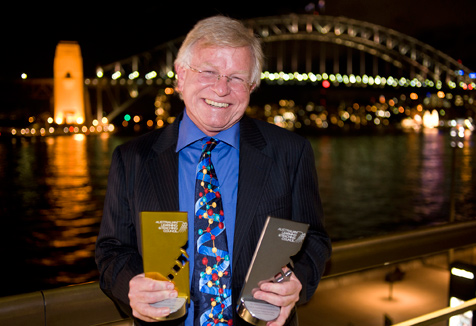Chemistry is cool, okay? So says the Australian University Teacher of the Year

His students will be the first to tell you: if anyone can help you understand the logic in a seemingly illogical chemical equation, then Associate Professor Roy Tasker can. Now, the university teacher who has spent over twenty five years helping students unlock the mysteries of chemistry has been named the Prime Minister's Australian University Teacher of the Year.
Associate Professor Tasker received his award from the Australian Learning and Teaching Council (ALTC) in a ceremony held at the Sydney Opera House on Tuesday 16 August.
The ALTC's Awards for University Teaching recognises university teachers across the country that have made an outstanding contribution to enhancing the quality of learning and teaching in higher education, and is the largest and most prestigious award ceremony of its kind in the sector.
Associate Professor Tasker, from the UWS School of Natural Sciences, has dedicated his career to transforming first-year students' understanding, knowledge and appreciation of science through his engaging teaching methods and his pioneering 'VisChem' - Visualising Chemistry - multimedia learning project.
His methods have enabled countless chemistry students to conceptualise the invisible world of molecules - no mean feat.
By using simulation and animation technology, he's able to demonstrate how this dynamic molecular world has an impact on everything around us, such as the way in which ice melts, or how haemoglobin - a "molecular handbag" according to Associate Professor Tasker - picks up and carries oxygen around the human body in such a way that it appears to have an instinctive intelligence all of its own.
He says he feels immensely proud and privileged to be the recipient of such a prestigious award, which he says is a great acknowledgement of the importance of learning and teaching in universities.
Even after twenty five years Associate Professor Tasker says he still gets a great buzz from standing up in front of a group of first-year undergraduates and seeing the moment when a student who might be struggling with a challenging idea or difficult concept finally has their breakthrough.
"I've had students who were so scared of chemistry they were almost in tears, but by breaking the concepts down and helping them to visualise what's happening at the molecular level, it opens them up to a whole new world and helps them to see how all those daunting, formal chemical symbols and equations fit together," he says.
"We have so much knowledge now about the different ways in which students learn, and it's important as teachers that we don't just think it's about us imparting knowledge or simply about presenting information in a more exciting way.
"Not only does a teacher need great knowledge and a passion for their subject, but they also need to have a rigorous, evidence-based approach to teaching and to be sensitive to students and their individual learning needs."
In accepting his award, Associate Professor paid particular tribute to his own mentors, which he believes are invaluable when beginning a teaching career.
"It's often assumed that teaching is something that you'll pick up as you go along, but it's a daunting prospect when you're starting out and it's wonderful if you can find someone who can provide that much-needed peer support and has a similar philosophy to teaching as your own," he says.
"I was very lucky to have such wonderful mentors who have helped me through my career - people such as Professor Peter Atkins from Oxford University, Professor Loretta Jones from the University of Northern Colorado, Professor Alex Johnstone from the University of Glasgow, and Professor Bob Bucat from the University of Western Australia."
As for whether chemistry has had an unfairly maligned reputation for being "too hard" or "too geeky", Associate Professor Tasker says he'd love to see more of the broader community get to know the wonders of chemistry.
"I think it would be great if more people understood how having a knowledge of the invisible molecular world broadens our sense of wonder and our perspective on life and the universe - just as astronomy, physics and biology have helped us to make sense of and appreciate our world."
Ends
17 August 2011
Photo courtesy of www.photocall.com.au
Mobile options:

